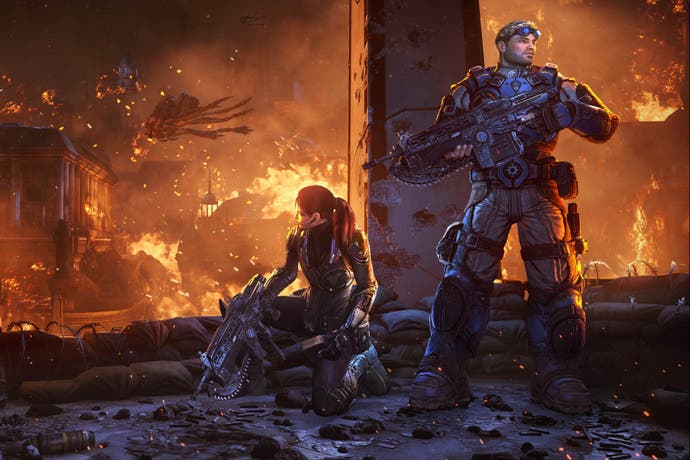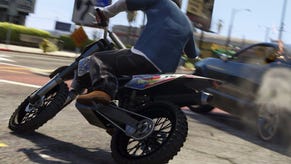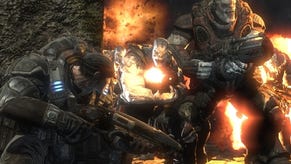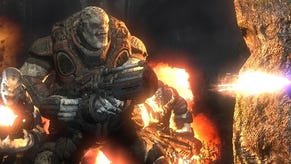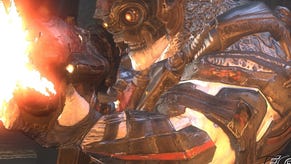Gears of War: Judgment review
Trial by fire.
Gears of War: Judgment is a third-person shooter. That may seem like stating the obvious, but it's perhaps the game's most refreshing aspect. We've been bombarded with increasingly top-heavy blockbuster games as this elongated hardware generation wheezes along, but Judgment suffers from none of the feature creep that has weighed down the likes of Assassin's Creed, Dead Space and Tomb Raider.
Our thick-necked COG soldiers simply pick weapons up off the ground. They don't build them, or craft accessories for them, or upgrade them with XP points. They're not distracted from the war against the Locusts to collect pages from notebooks or pick 10 mushrooms. Nor do they have a cosy domestic hub, and if they did you can bet they wouldn't give a s*** how it was decorated. The world they inhabit is one of relentless forward progression, in which only two things matter: shooting the enemy and not letting them shoot you back. Yes, Gears of War: Judgment is a third-person shooter, and is all the better for its simple, unpretentious gameplay focus.
Clarity of purpose doesn't go hand in hand with innovation, however. This is a machine-tooled game, as slick and unsurprising as you'd expect from a series that has made four appearances in just over six years. The cover system, the active reload mechanism, the grenade throwing, the chainsaw executions - all are as effective as they are familiar.
What new developer People Can Fly has done is tweak the structure and tone. The game is now broken up into short, punchy sections bookended by leaderboards rather than drawn-out levels. Each section lasts maybe 10 minutes on normal difficulty and contains, at most, two firefights. Some are Horde-style fortification scenarios in which you must hold your ground against waves of enemies. Most are the sort of shooting galleries you expect from a Gears title.
This bite-sized presentation changes the tempo of the game, placing a new emphasis on replaying for score. Every section also offers a Declassified Mission - essentially an optional modifier for the encounters ahead. You might be restricted to specific weapon types, face tougher enemies or a claustrophobic time limit, or have your vision limited by smoke or gas.
Each section offers up to three stars, the value of which varies depending on difficulty. Stars are awarded for good performance - headshots, executions and gibs - but deducted every time a player is downed. Activating a Declassifed Mission means stars accumulate faster and also grants a hefty star bonus for completion. Forcing the player to juggle risk and reward for every scenario, it's the sort of skill-based feature you'd expect from a graceful Japanese action game like Bayonetta or Vanquish, and it gives Judgment a refreshing and digestible arcade feel.
Even more refreshing: those stars don't really matter, which is to say that they matter very much. Levelling up in Judgment doesn't unlock better weapons or new abilities. Whether playing solo, co-op or versus, there's no tangible advantage to be gained from grinding. Instead, persistent success at specific feats will earn you ribbons and medals from a vast selection. Medals come in four tiers, which offer no gameplay benefit but instead provide unique titles visible to other players. There is a constant progression stream underpinning everything you do, and everything you unlock has only one purpose: to show other players what you've earned, how far you've come, how damn good you are. This is a shooter with a brilliantly level playing field where bragging rights are the only currency of value.
That's not to say the game's campaign is without flaw. A prequel told in flashback and set in the immediate aftermath of Emergence Day, it follows Damon Baird and his Kilo strike team as they fight to save Halvo Bay from a rampaging Locust commander called Karn.
This is a shooter with a brilliantly level playing field where bragging rights are the only currency of value
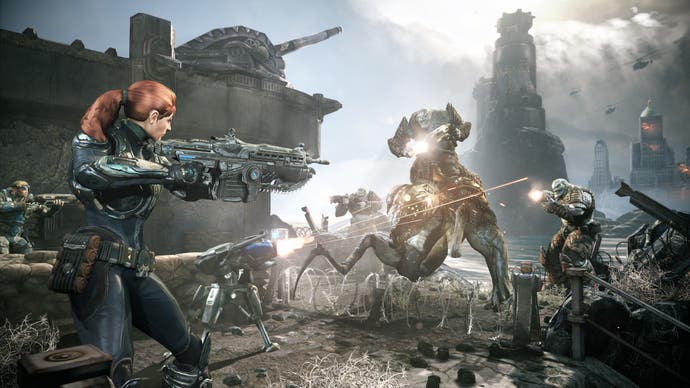
The events are retold as Baird and his team stand trial for some as-yet-unexplained war crime, with player control shifting from one character to another as they recall what happened. The game never really seizes the narrative potential of this well-worn but potentially effective storytelling device. Whether playing as returning character Augustus "Cole Train" Cole or newcomers Sofia Hendrik and Garron Paduk, the tale unfolds pretty much as you'd expect.
Slivers of character development slip out, but the series retains its tin ear for dialogue. Gone is the ludicrous, melodramatic machismo of the previous trilogy, but there's nothing equally distinctive to replace it. Bulletstorm showed that People Can Fly can bring an insouciant outsider's perspective to the brawny action hero genre, but its sly wit is absent here. The characters are mired in archetype and the return to the present day brings no twist or revelation to justify the flashback structure.
Similarly, the snappy arcade-paced sections slip down easily but very few leave much of an impression. A battle through Halvo Bay's wealthy districts, left ruined and bloodied by the Locust surge, offers a glimpse at a side of the Gears world we've not seen before. A pitched battle set around the remains of a victory parade from the Pendulum War manages to strike a poignant note, while the game's best section finds you storming a fortified beach, Normandy-style, before defending the same beach head later. The game's breakneck pace means that none of these ideas outstays its welcome, but also prevents them from flourishing into truly memorable encounters.
While it deserves praise for not succumbing to the bloat of its triple-A peers, the Judgment campaign - and the companion bonus campaign, Aftermath, which ties the events to Gears of War 3 - are still a little long in the tooth. Technically adept but largely familiar, it's fun while it lasts, but there's a sense that we've been down this crumbling, gore-spattered road too many times in the recent past.
What pushes Judgment over the line from "pretty good" to "pretty great" is multiplayer. Not the same old versus matches that have been a staple of the series since 2006, nor the wave-based Survival mode, nor the late addition of a basic free-for-all deathmatch, nor or the King of the Hill variant, Domination. Those are all fine, but standard fare. No, the secret weapon in Judgment's arsenal is OverRun, a hybrid game mode that pulls together the best elements of the series' online play into something epic and satisfying.
At heart, OverRun is a close relation to Battlefield's Rush mode. The COG team is on the defensive, holding back a player-controlled team of Locusts and (hopefully) preventing them from opening sealed Emergence Holes. Fail twice and the humans have to fall back to protect a generator. If the Locusts destroy that, it's all over. Similarly, if the COG can hold the line until the round timer runs out, the Hammer of Dawn fires up and obliterates the monsters.
With a fuss-free class system and tight, well-planned maps, OverRun is Gears multiplayer at its best, combining the strongest elements of deathmatch and survival game types into one nail-biting experience. There's a great balance between frantic action and tactical collaboration, while the addition of some verticality - reachable by the Scout class for sniping duty - subtly changes the ebb and flow. It's a mode where players of any skill level can find room to shine, but only the best will emerge with the medals and ribbons.
Despite the danger of being seen as a last-gasp attempt to squeeze the last drops from the Xbox 360, Judgment is a game with a long-term future
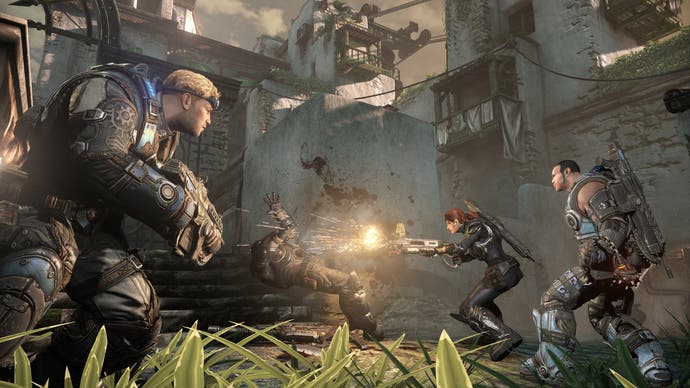
That Judgment's multiplayer is open to everyone is also worthy of praise. There is a season pass, but it only offers access to VIP lobbies where higher XP can be earned, along with early access to new maps. There are no super-powered weapons or short cuts for those paying extra, and standard public matches are not hidden behind a paywall. It's a sad indictment of where the shooter genre has ended up that this is worthy of note. It's an inclusive, egalitarian gesture that underlines the assumption that Judgment's long-term future is online.
And - despite the danger of being seen as a last-gasp attempt to squeeze the last drops from the Xbox 360 - Judgment is a game with a long-term future. Everything about it is designed to encourage and reward repeat play, whether in the co-op campaigns or the multiplayer lobbies. Even the achievements are set up for the long haul, handing out small rewards for basic completion but saving the big paydays for rinsing the levels on the hardest settings and maxing out your character level multiple times.
Even with the pall of over-familiarity lingering over it, Gears of War: Judgment is a timely reminder that ruthless focus on gameplay, generosity towards players and good old-fashioned design craft can still pay dividends at a time when big-budget action games are at risk of fragmenting into splinters of mindless busywork. Sometimes, being a bloody good shooter is all that's required.
